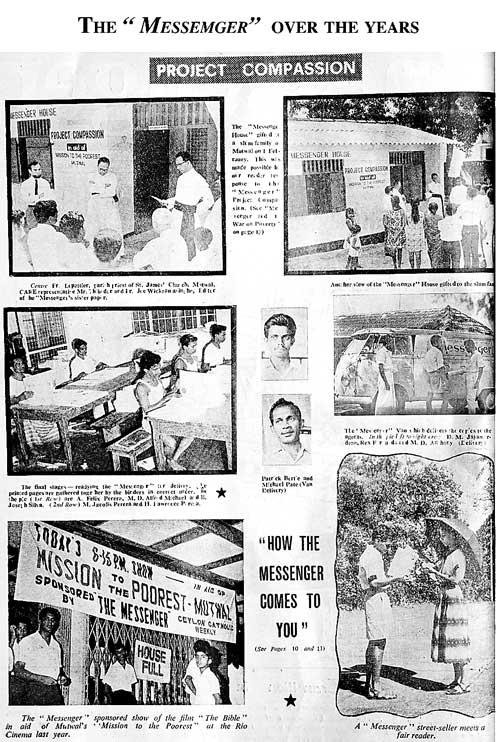Reply To:
Name - Reply Comment
Longest circulating English newspaper celebrates 150 years
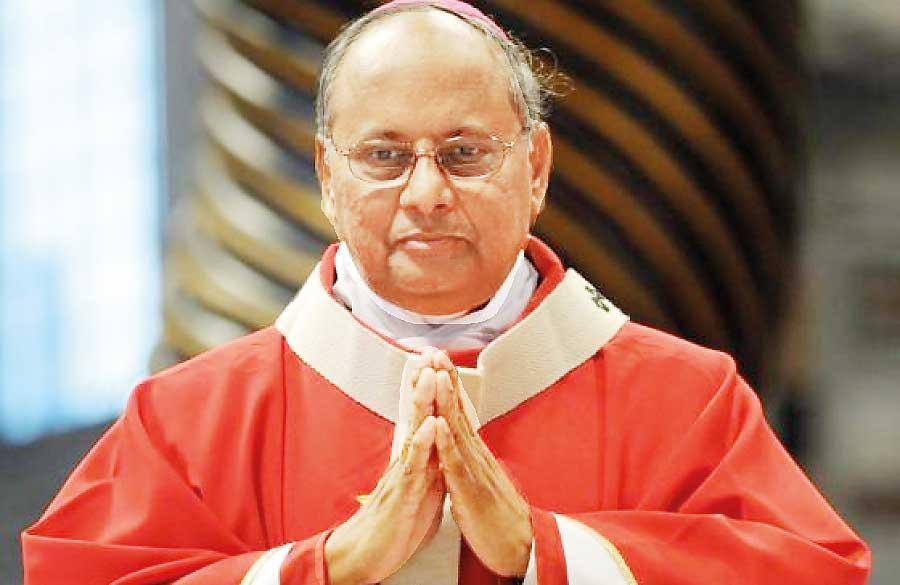
‘Messenger’, the only English newspaper in Sri Lanka that has continuously been in publication for 150 years celebrated its Sesquicentennial  Jubilee on December 16.
Jubilee on December 16.
‘Messenger’ in its true sense of the word, has been rendering its services to Sri Lankan Catholics by providing news and articles related to the Catholic Church. Its continuous journey since 1869 sets an example for other local as well as international newspapers.
Speaking to Daily Mirror the Colombo Catholic Press (CCP) Director and Editor of Messenger, Gnanartha Pradeepaya and Lama Pradeepaya, Rev.Fr.Camillus Fernando said, “This is to promote the Catholic faith in Sri Lanka. Messenger has done its job in this regard for 150 years and will do the same in the future too. We also promote religious harmony in the country and always work towards ethnic reconciliation too”.
The pioneers in commencing the publication ‘Messenger’ were the Fonseka family during the ancient Kotte kingdom. It was during late 19th Century and through the efforts of descendants of Suseu Fonseka, the chief of the Guards of Whelm Jacob de Graff, Dutch Governor of Ceylon. They were backed by priests who belonged to the Order of Saint Benedict (OSB). On February 11, 1869, at a private press established by a group of lay entrepreneurs, Francis Fonseka, the grandson of Suseu Fonseka printed the maiden issue of ‘Messenger’ with the support of his brother Joseph. The press was equipped with Letterpress, a method of printing during which raised surfaces covered with ink are pressed onto paper. This method of printing was considered popular at that time.
This first issue was named ‘The Ceylon Catholic Messenger’. Although Fonseka had a fair background in the Government printing establishment before entering entrepreneurial enterprise, this was considered as a bold venture at that time.
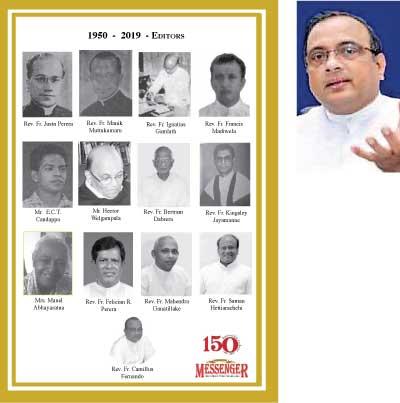 Transferring the publication
Transferring the publication In February 1870, a year after commencing the press, Fonseka was compelled to give up his service due to financial constraints. Though he resigned from his new venture which he started afresh, the publication of the paper was never interrupted. The last paper under the old management appeared on 20th January1870. Later the ownership and management of the press were transferred to the Catholic Orphanage (CO) in Kotahena, and was called ‘The Ceylon Catholic Orphan Press’ (CCOP). It was a press where children and youth were being trained for work. Subsequently the ownership was transferred to the Archdiocese of Colombo while the management of the press was handled by the CO.
The first issue of the paper by the CCOP appeared on February 15, 1870. Despite the changes in the new management, the size and the format of the paper remained unchanged. Though the press came under the control of Archdiocese of Colombo, there were no changes in the subscription rates of the paper.
In 1896, the name of the CCOP was changed to St.Lucia’s Press, Kotahena and its management was directly handled by the Archdiocese of Colombo. In 1901 the press was shifted to Borella alongside the Archbishop House, but the printing establishment bore the name St.Lucia’s Press until July 26. Later it was renamed as ‘The Colombo Catholic Press’.The last issue that was printed at St. Lucia’s Press Kotahena was on May 31, 1901. The next issue from the Borella premises appeared on June 7, 1901.
During this period, along with ‘Messenger’, another Catholic Weekly in English named ‘The Catholic Guardian’ was printed in Jaffna under the patronage of the Diocese of Jaffna. Having understood the redundancy of running two catholic weeklies in English language simultaneously, the bishops in the island decided to give priority to one Catholic weekly in English allowing the paper to function efficiently.
Thus ‘Messenger’ was printed in Colombo and distributed in Jaffna too. The next issue came from the present premises in Borella on June 7, 1901. Later it received a new name, ‘The Colombo Catholic Press’ (CCP). The new building in Borella was received with the patronage of Rt.Rev.Dr. Andrew Melizan O.M.I, who was the second Archbishop of Colombo then.
From 1902 to 1924 the press at the CCP underwent a great transformation due to the ardent efforts of Rev.Fr.C.Conrard, the manager of the press who brought new machinery to the press and extended its scope of work; bringing reputation to the paper.
For a period of 150 years the Messenger’s journey has never been smooth owing to the challenges it has been confronted with.
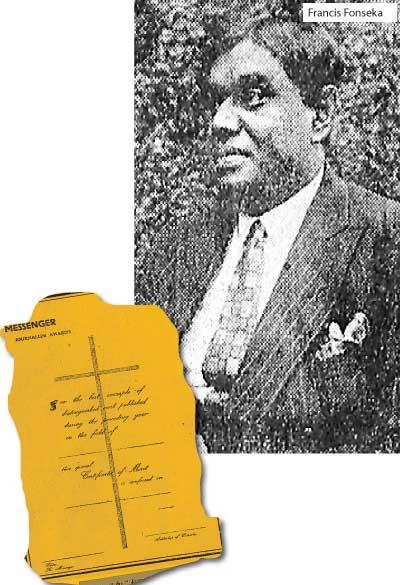
Since the beginning of ‘Messenger’ up to now, it has faced many challenges in numerous ways. It is noticeable that during certain changes in socio-political settings in different times, since its origin, the publication of the paper continued regardless. When Rt. Rev. Dr Oswald Gomis, Archbishop Emeritus was the Director of Catholic Press, ‘Messenger’ faced a shortage of printing paper as the paper materials were distributed on quota basis. During that period, Rt. Rev. Edmund Peiris OMI, the bishop of Chilaw Diocese sent paper material to Colombo Diocese as a support to meet the shortage.
"Messenger was printed in Colombo and distributed in Jaffna too. The next issue came from Borella on June 7, 1901. Later it received a new name, The Colombo Catholic Press. The new building in Borella was received with the patronage of Rt.Rev. Dr. Andrew Melizan O.M.I, who was the second Archbishop of Colombo then"
In a context where there is a greater tendency for newspapers to become politicised, Rev.Fr.Fernando opined, “We don’t back any political party and it has been very clear right throughout, not only now, but for 150 years”. He also insisted as a paper that ‘Messenger’ has never been accused of showing partiality to a particular political party. But its responsibility in informing Catholics in every nook and corner was well manifested in the way ‘Messenger’ publicised the brutal April 21 massacre carried out by ISIS extremists.
Though the Easter Sunday attack didn’t affect the printing of the paper, there had been issues related to distribution and purchasing of the publication. At a time where the church congregation couldn’t gather at churches and the churches were closed due to security reasons, the distribution of the paper was halted for some time. Since there were no advertisements the paper ran without income. As Rev.Fr.Fernando said that during this time, the Archbishop of Colombo His Eminence Malcom Cardinal Ranjith, the Archbishop of Colombo had extended his help in terms of financial assistance to CCP to cover production costs and pay wages of employees.
Rev.Fr.Fernando also insisted that Catholic Press should maintain a security fund for the future of the press in the face of such events.
Today fundamentalism has raised its head rapidly around the world. Rev.Fr. Fernando said that they had tried their level best to address the situation by making readers aware of the real facts and differences between the Catholic Church and fundamentalists. “We have been publishing many articles on fundamentalism explaining what it is and the programmes that are carried out by the Catholic Church” Rev. Fr.Fernando further stressed.
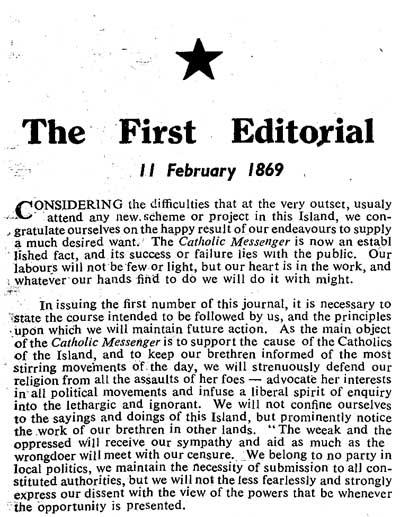 As Rev.Fr.Fernando noted that one of the challenges that ‘Messenger’ faces is the shortage of English journalists. He also stressed that most writers who write for the publication are above fifty years of age. Today, many readers can produce opinions on what others have written. Their inability to write in English is a major drawback. Besides he also underscored that in a society where everything has become instant and people demand instant results, many lack the mental convergence
As Rev.Fr.Fernando noted that one of the challenges that ‘Messenger’ faces is the shortage of English journalists. He also stressed that most writers who write for the publication are above fifty years of age. Today, many readers can produce opinions on what others have written. Their inability to write in English is a major drawback. Besides he also underscored that in a society where everything has become instant and people demand instant results, many lack the mental convergence
to write.
Celebrations of the 150th Anniversary of ‘Messenger’ were held on December 16 under the distinguished patronage of His Eminence Malcom Cardinal Ranjith, Archbishop of Colombo, at the Auditorium of the Archbishop’s House, Colombo 08. The celebrations were held under the theme ‘We remember -We Celebrate’. At the very outset of the ceremony, ‘a minute’s silence’ was observed to remember the victims of the Easter Sunday attack.
Addressing the gathering at the ceremony, His Eminence said, “Do not play with the future of this country. I call upon all communities living in this land to shun all differences of race, creed and cast and join hands to create a society where Unity, Peace and Justice prevail”. Stressing the the need for all segments of the society to come together, he also insisted that the media evolve towards fulfilling the needs of today’s society; where unity is needed unlike ever before. His Eminence also highlighted the role of the media in society urging Media organisations to be an instrument of unity.
Finally the celebration was made much colourful with entertainment coming in the form of Christmas carols being sung by various groups invited to perform at the celebration.
